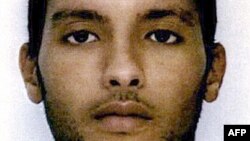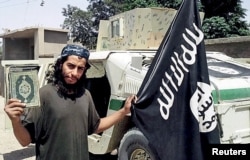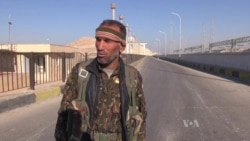The U.S. military says an Islamic State (IS) leader with direct links to the alleged ringleader of last month's terrorist attacks in Paris was killed in a coalition airstrike in Syria.
A coalition spokesman, Colonel Steve Warren, said in a news briefing Tuesday that Charaffe al-Mouadan was killed last week on December 24.
He said Mouadan had ties to Abdelhamid Abaaoud, believed to be the leader of the cell that coordinated the Paris attacks, which left at least 130 people dead. Abaaoud was killed in a police raid a few days after the on November 13 Paris attacks.
Warren said Mouadan was "actively planning additional attacks against the West," but did not specify if he was targeting the U.S. or Europe or both.
Warren noted that Mouadan was among a total of 10 Islamic State "leadership figures" who have been killed in coalition airstrikes in the past month.
They include another IS figure who had "links" to the Paris terror network and a Bangladeshi man educated in Britain who was allegedly a hacker for Islamic State.
Retaking the dam
In another development in Syria, a U.S.-backed alliance of Kurdish and Arab rebels seized a key dam on the Euphrates River from Islamic State fighters, Warren confirmed. He said the Syrian Democratic Forces (SDF) captured the Tishrin Dam late Saturday after intense clashes with IS.
The 900-meter-long Tishrin Dam, held by the Islamic State since last year, supplies electricity to much of northern Syria.
In addition, capture of the dam isolates the Islamic State group's strongholds in northern Aleppo from its territories east of the Euphrates River, where Raqqa city — its de facto capital — is located.
Members of the Syrian Democratic Forces talk about Tishrin Dam:
Local Syrian forces on the ground were backed by coalition airstrikes during the operation, and the Pentagon confirmed that 26 airstrikes were launched in the offensive. While the local fighters express appreciation for the support, they say they expect more from the U.S. and other countries in the coalition.
"The airstrikes have helped us, yet the delivery of the arms has not been enough,” said Telal Silo of the Syrian Democratic Forces. “In fact, it has been below our expectations. We received ammunition, but not enough weapons to fire them. We arranged them ourselves. We hope that the U.S.-led coalition would better help us so that we can defeat terrorists."
Leader's death complicated
Meanwhile, the United States said the recent killing of a top Syrian rebel leader complicates efforts to bring a cease-fire and political resolution to the country’s nearly five-year conflict.
Zahran Alloush, the head of a group called Jaysh al Islam, died in an airstrike Friday that was claimed by Syrian government forces.
On Monday, U.S. State Department spokesman Mark Toner said the United States has some concerns about Jaysh al Islam’s actions in Syria, but that it participated in a conference of rebel groups, supported a political process and fought against the Islamic State group.
“I think we would agree that it doesn’t send the most constructive message to carry out a strike like that,” Toner said. “And as I said, it complicates those efforts. It is our hope that these strikes don’t reverse any progress that we’ve made.”
VOA National Security correspondents Jeff Seldin and Mahmood Bali contributed to this report








